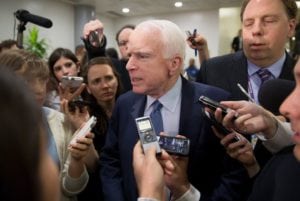“Becoming a reporter is the only thing I ever wanted to do.”
Alice Ollstein has been involved with the news media industry since eighth grade when she wrote book reviews for the local newspaper in her hometown of Santa Monica. Now, Alice is a political reporter for Talking Points Memo and also one of our Rising Stars. I caught up with Alice to ask her a few questions:
How did you get started in the news media industry?
After the book reviews in eighth grade, I wrote for my high school paper, I freelanced and I wrote for my college newspaper while attending Oberlin College.
Of course, I was worried about finding a job after college…I graduated in 2010 which was an awful time for the industry. There were layoffs, it was just a dicey landscape I was going into. It was definitely difficult to see all the financial challenges happening in the industry. I figured I had to make it somehow so I moved to D.C. and started an internship with a podcast from National Geographic where I audio edited and recorded. I continued in the radio news industry and began working for Capitol News Connection where I covered Congress. After that, I got back into written reporting and now here I am at Talking News Memo since last February.
Describe a “typical” day on the job.
It really depends on what is happening that day, but many mornings I go straight to the Capitol. I bike to work and I get to park my bike in the same place all the senators park! I arrive pretty early because it’s sort of a first-come, first-served situation. Even while I’m there though, the days are different. The easiest time to get quotes is when there is a Senate or House vote. My day-to-day job is actually a pretty awesome privilege – I go to four-hour hearings and I make them into a distilled product for the public; it’s a public service that is very important.

What was the coolest day you’ve experienced while working?
When I was a radio reporter I covered some really big days. One was when the Supreme Court struck down an important part of the Voting Rights Act. I was standing right next to John Lewis when it happened. It was emotional and I could see and hear the raw reactions firsthand. I was also there for the Supreme Court hearing on same-sex marriage. There was crying, hugging and smiling. It’s so interesting to be there for that kind of stuff – hearing the arguments and the justices cut each other off and challenge litigators. Also, there were some wild moments on the campaign trail. At the Republican National Convention, I remember the raw emotion and anger that filled the room after Trump gave his speech. I also remember “You Can’t Always Get What You Want” being played right after his speech as well.
As a Rising Star winner and someone young in the industry, do you have any advice?
The path isn’t always direct leading up to becoming a reporter. I remember when I was applying to college, all I wanted was to go to journalism school but I couldn’t because of finances. In my last job, my co-worker who had the exact same position at the company as I did had gone to one of the prestigious colleges I had always wanted to go to, and here we were in the exact same position. One of my editors used to be a lawyer; you can come from wherever and that can make you a good – or even better – journalist. Right now is a good time to be in the industry at this age range. There’s a sense of camaraderie. We tend to help each other out. Remember that no matter your age, issues that affect the industry hit everyone a part of the industry.
I also want to make sure that young people know they should advocate for themselves in the workplace. As young people, we are sent the message that we should be grateful we have any job no matter what it is. I disagree; ask for a raise, ask for vacations and health care. You deserve all those things.
What do you see as the future of news media?
I see a very rich media landscape. I don’t think there is one correct model for the news media industry; as many different models as possible could work. While traditional news organizations are the ones with major scoops, smaller outlets do incredible things too. To function as an industry, we need all of the pieces.
Right now, I worry about political polarization. I see the general public’s view of the news media firsthand. Sometimes, I receive hate mail, screams, etc. I think it’s important to try to understand those types of people better and not just write them off as crazy.
I also think media literacy efforts are really interesting. It’s important to teach from an early age what the purpose of media is, how journalists go about reporting, how stories are made…I don’t think the average person knows this and it’s our job to be more transparent to increase their literacy and trust.

